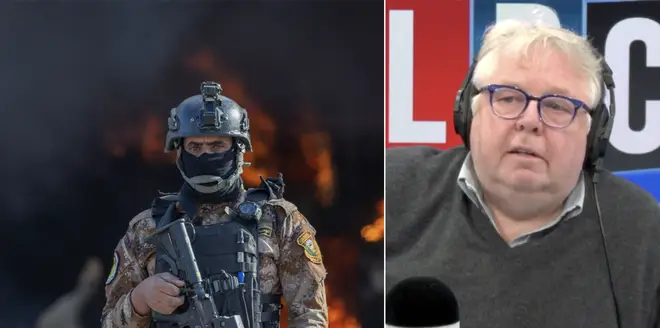
Natasha Devon 6pm - 9pm
3 January 2020, 07:42 | Updated: 3 January 2020, 07:52
A Middle Eastern expert told Nick Ferrari what the US killing of Iran's most senior General will mean in the region.
World War 3 started trending on Twitter following the airstrike in Baghdad, which was directed by President Trump in retaliation for attacks on the US Embassy in Iraq earlier this week.
Hiwa Osman, an analyst on Iraq, told LBC that most Iraqis are pleased General Qassem Soleimani had been removed, but are concerned that their country may become the venue for a war between the US and Iran.
He said: "The Supreme leader of Iran has said that he will respond to America and take revenge for Qassem Soleimani in a very strong way.
"We still don't know what he means by that.

"Iraqis generally are quite worried. On the one hand, they are happy for the demise of Qassem Soleimani. But on the other hand, they are quite worried that their country becomes the arena for a conflict between the USA and Iran."
Explaining why the US targeted General Soleimani, Mr Osman stated: "He is the leader of the IRCG, the Quds force, a force that's been responsible for exporting the Iranian revolution to other parts of the Middle East.
"He's been a staunch enemy of the United States and of the West and he's been responsible for many attacks that took place in the past, especially in Iraq.
"According to reports, he is the one who has been responsible for the crushing of the protests from the Iraqi people, calling for better government."
Hear his full analysis at the top of the page.
Following the airstrike, US President Donald Trump simply posted a picture of an American flag to his Twitter account.
— Donald J. Trump (@realDonaldTrump) January 3, 2020
An adviser to Iran's President Hassan Rouhani quickly warned US President Donald Trump of retaliation from Tehran.
Hessameddin Ashena wrote on Telegram: "Trump through his gamble has dragged the US into the most dangerous situation in the region. Whoever put his foot beyond the red line should be ready to face its consequences."